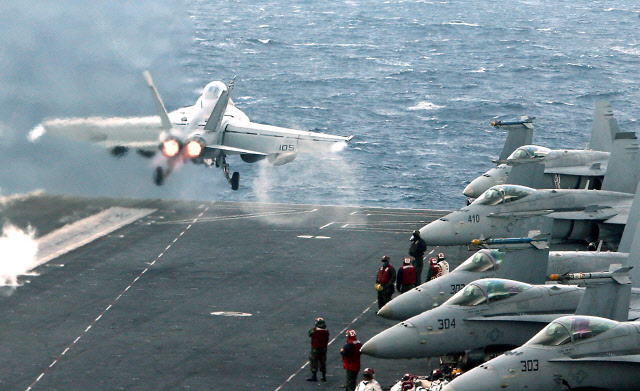 |
|
A US fighter jet taking off from an aircraft carrier
|
Data shows USFK doesn’t even use all of its allocated funds
US President Donald Trump is a well-known devotee of the deal, or in other words, negotiating. He even published a book called “The Art of the Deal,” in which he said that making deals brings him joy and that he considers negotiating to be an art form. For a deal fanatic such as Trump, the recent cost-sharing negotiations over South Korea’s contribution to supporting the US troop presence must have been far too tempting to simply entrust to the normal negotiators. Trump personally demonstrated the “art of the deal” in the negotiations. While the negotiations were in full swing, he pushed for a major increase in South Korea’s defense contribution by firing up his “free ride” rhetoric at every available opportunity. And then in December 2018, he ratcheted up the pressure further by leaking the specific figure of a 50% increase to the US media. The cost-sharing negotiations were a nail-biter to the very end, when a deal was reached for South Korea’s share to go up 8.2% year on year to 1.04 trillion won (US$923.6 million). While the South Korean negotiating team had been determined to hold the line at 1 trillion won, they couldn’t resist the US’ demand for a big bump in the amount. I suspect that these negotiations will go down as yet another successful example of the distinctive negotiating style of Trump the real estate developer, who makes absurd threats to create a crisis and then pockets a nice profit. The South Korean negotiators might console themselves with the thought that they put up a decent fight in the negotiations, considering that the US president was personally pushing for a higher contribution, but NGOs have offered a starker appraisal. Documents provided by Solidarity for Peace and Reunification of Korea, which has long delved into issues related to US Forces Korea (USFK), show that USFK has failed to use between 10-20% of South Korea’s total contribution every year since 2014 and that, as of the end of Dec. 2017, 1.08 trillion won (US$959.1 million) remained undisbursed. Furthermore, USFK had been allocating 170-180 billion won (US$159.9-159.87 million) of that contribution to the Pyeongtaek base relocation project each year from 2009 to 2017. But the base relocation has now entered its final stage, which provides a reason to reduce that contribution. It’s hard to understand why South Korea allowed an increase even bigger than the 2.5% okayed by former president Lee Myung-bak and the 5.8% by Park Geun-hye. S. Korean government failed to take back money US military earned via interest The government violated a promise it had made through its ambiguous handling of the interest earned by South Korean funds deposited by the US military. In 2002, the US military began depositing the cost-sharing contribution in a bank controlled by the US Defense Department instead of allocating it to the cost of relocating the base. At one point in the late 2000s, the deposited funds exceeded 1 trillion won (888.14 million), and as of June 2018, 288 billion won (US$255.8 million) was still deposited there. The revelation of the fact that the deposited funds were earning interest triggered anger at the US military for exploiting South Korean funding for monetary gain and led to demands for the interest to be returned, and the government promised the National Assembly in April 2014 that it would ensure in the next round of negotiations that the earned interest would be reflected in the total amount of South Korea’s contribution. But the earned interest doesn’t appear to have been subtracted from the total in these negotiations, as the government said it would. While South Korea’s Ministry of Foreign Affairs said that it brought up the issue in the negotiations, it has yet to provide a straightforward answer about exactly how that was reflected in the total. Documents that Solidarity for Peace and Reunification of Korea has submitted to the courts lead to the calculation of 56.6 billion won (US$50.27 million) of earnest interest for the two years of 2006-2007. The entire amount of interest since 2002 is estimated as being greater than 300 billion won (US$266.43 million).
 |
|
Park Byong-su, editorial writer
|







